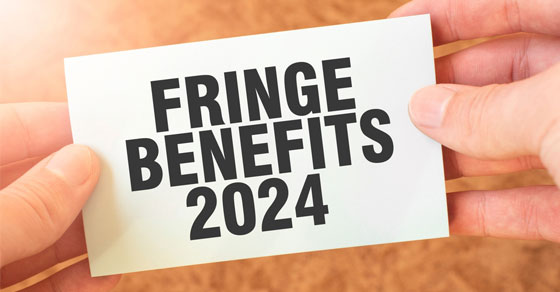
Highlights of Next Year’s Fringe Benefit COLAs
The IRS recently released Revenue Procedure 2023-24 to announce the 2024 cost-of-living adjustments (COLAs) for various tax-related limits applicable to many popular employer-provided fringe benefits. Here are some highlights:
Health Flexible Spending Accounts (FSAs). For 2024, the dollar limit on employee salary reduction contributions to health FSAs will be $3,200 (up from $3,050 in 2023). In cases where a cafeteria plan allows carryovers of health FSA balances, the maximum amount from 2024 that can be carried over to the 2025 plan year will be $640 (up from $610 in 2023).
Qualified transportation fringe benefits. The monthly limit on the amount that may be excluded from an employee’s income for qualified parking benefits will be $315 (up from $300 in 2023). The combined monthly limit for transit passes and vanpooling expenses will also be $315.
Qualified Small Employer Health Reimbursement Arrangements (QSEHRAs). The maximum payments and reimbursements under a QSEHRA will be $6,150 for self-only coverage and $12,450 for family coverage (up from $5,850 and $11,800, respectively, in 2023).
Adoption assistance exclusion and adoption credit. The maximum amount that may be excluded from an employee’s gross income under an employer-provided adoption assistance program for the adoption of a child will be $16,810 (up from $15,950 in 2023). In addition, the maximum adoption credit allowed to an individual for the adoption of a child will also be $16,810.
Both the exclusion and credit will begin to be phased out for individuals with modified adjusted gross incomes greater than $252,150 (up from $239,230 in 2023) and will be entirely phased out for individuals with modified adjusted gross incomes of $292,150 or more (up from $279,230 in 2023).
Benefits under a dependent care assistance program (DCAP). The DCAP limit isn’t indexed for inflation so, for 2024, it will remain at $5,000 for single taxpayers and married couples filing jointly, or $2,500 for married people filing separately. These dollar amounts will apply in future years, too, unless extended or otherwise changed by Congress.
That said, some adjustments to certain general tax limits are relevant to the federal income tax savings under a DCAP. These include the 2024 tax rate tables, earned income credit amounts and the standard deduction.
Archer Medical Savings Accounts (MSAs). For participants who have self-only coverage in an MSA, the plan must have an annual deductible that’s not less than $2,800 in 2024 (up from $2,650 in 2023), but not more than $4,150 (up from $3,950 in 2023). For self-only coverage, the maximum out-of-pocket expense amount will be $5,550 (up from $5,300 in 2023). For tax year 2024, the annual deductible for family coverage cannot be less than $5,550 (up from $5,300 in 2023). However, the deductible cannot be more than $8,350 (up from $7,900 in 2023). For family coverage, the out-of-pocket expense limit will be $10,200 (up from $9,650 in 2023).
The end of the year is almost here. That means employers should act now, if they haven’t already, to determine whether their benefit plans or programs will automatically apply the latest limits or need to be amended, if so desired, to recognize changes.
If your organization does indeed make revisions, clearly communicate the changes to your staff. Contact us for further information about next year’s COLAs, as well as for help assessing the costs of offering tax-friendly fringe benefits.
© 2023